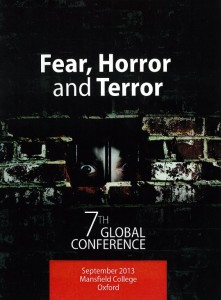By Leischen Stelter
What do you remember from the terrorist attacks of Sept. 11, 2001?
We all have memories from that day: Where we were, what we were doing, and our emotional reactions as we watched events unfold on television or in person. These memories are things we will never forget and each time we remember them, they evoke feelings of fear and horror and terror from that day.
These memories and emotions are rekindled every year when the news media replays images from that day—people jumping from the towers to their imminent deaths; firefighters weeping, their faces stained with dust and soot; and people in business attire running through the streets as millions of pieces of paper rained down from the smoking towers.

“What I’m interested in is how the state uses the memory of this horrific event to enhance its response to that event, especially now that we are 12 years into a war on terror,” said Dr. Campos.
His paper, Memory and Remembrance: The Diffusion of Fear, Horror and Terror into Control and Legitimacy, focuses on how sovereign nations transform the fear, horror and terror experienced by the populace and turn it into a mechanism that stabilizes the state and lends legitimacy to future actions. Campos argues that the myths and heroes we collectively create are also a key component in extending statist authority and control.
He writes:
“A collective imagination and memory about an event become the mechanisms through which fear, horror and terror are manipulated and controlled. The constant news coverage surrounding the 9/11 attacks ingrained in the public imagination/collective memory specific images – the destruction of the World Trade Center and [the attack on The] Pentagon, victims plunging off the World Trade Center to end their suffering, and the constructed heroism of the 45 passengers and crew of the United Airlines Flight 93 that crashed in Pennsylvania – that later were the tools through which the PATRIOT Act passed and preemptive invasions occurred.”
The continued memorialization of the terrorist attacks—year after year—only serves to keep the fear, horror and terror vivid in the imagination of the public and used to enhance statist authority, he said. These memories become critical to the populace’s identity, citizenship and sense of belonging.
Campos also writes:
“In the face of fear, horror and terror— especially that produced by terrorism— historical imaginations provide a space in which time and identity coincide in the construction of heroes and myths. The creation of heroes and myths establishes a site through which the consciousness of the citizenry is mobilized within specific formulations of national security. In the manipulation of the American democratic historical imagination, the creation of heroes calls forward (and plays on), all positive aspects of the U.S. state’s development.”
Thus, it has become imperative, he writes, that we investigate the effects of the fears generated by these traumatic memories and look at the ways in which fear has become a political force, contributing to the state’s authority and action.
Comments are closed.